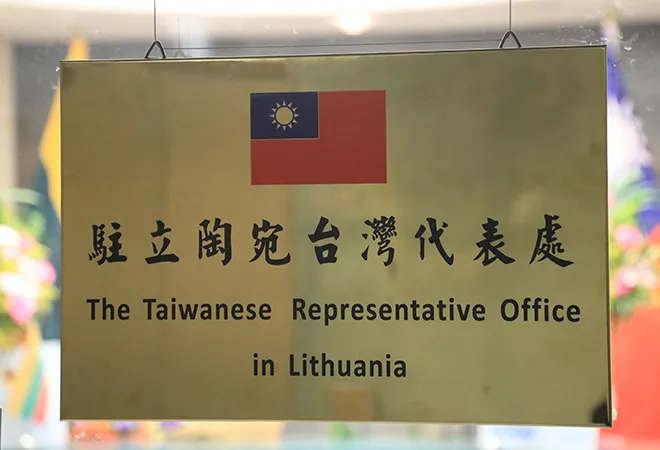
In terms of GDP, it ranks 22
nd out of 27, below Luxemburg, Bulgaria, and Croatia. In terms of per capita income, it ranks 19
th, below Estonia, Czech Republic and Portugal. But in terms of taking a moral and spirited stance against the excesses of China, the tiny nation of Lithuania is punching way above its weight and has set a benchmark that the rest of the European Union (EU) must support and follow. Such leadership, particularly when stronger countries like Germany and France are buckling under the pressure and onslaught of this rising rogue nation, needs to be supported by countries across the world.
Three days after Lithuania set up a
Taiwanese Representative Office in Vilnius on 18 November 2021, and used the word ‘Taiwan’ instead of ‘Taipei’—the capital of the country, whose official name is ‘Republic of China’—as the rest of the world does, Beijing began its usual huffing and puffing by
downgrading diplomatic relations with the Baltic nation from ambassadorial to chargé dˈaffaires.
Threats by the Chinese Communist Party (CCP), that has a country appended to it, have little meaning for Lithuania. Economically, China is not a significant trading partner. China ranks 10
th in terms of imports and doesn’t figure amongst the top 10 export markets for Lithuania, whose largest trading partner, in terms of both imports and exports, remains Russia.
In terms of security, neither does China share a border with it nor can it reach Lithuania without trampling over other EU nations. Besides, as a North Atlantic Treaty Organisation (NATO) member, Lithuania’s security interests are protected by the 30 members as part of “collective defence,” where an attack against one of NATO members is considered an attack against all.
China ranks 10th in terms of imports and doesn’t figure amongst the top 10 export markets for Lithuania, whose largest trading partner, in terms of both imports and exports, remains Russia.
It is not surprising, therefore, that Lithuania gets strategic economic support from the United States (US). In September, US Secretary of State, Antony J Blinken, while welcoming Lithuanian Foreign Minister Gabrielius Landsbergis,
came down strongly on China: “Lithuania and the United States are very strong partners in NATO,” he said. “We stand together for collective defence and security. We stand against economic coercion, including that being exerted by China.” On 23 November 2021, Landsbergis is expected to sign a US
$600-million export credit agreement with the US Export-Import Bank.
What’s surprising, even shocking, is the way the EU biggies are bending over backwards to accommodate the CCP, ignoring human rights issues and labour camps in China. One reason could be the higher stakes of larger economic engagement. Germany, for instance, is
on the defensive because of potential adverse impact of economic repercussions from China on Volkswagen, Siemens or BASF. Along with Germany, France is supporting the Comprehensive Agreement on Investment (CAI) with China. Both stand on the fence as far as allowing the Chinese firm Huawei to offer 5G services in their countries, despite a clear and present danger of the company being an arm of the CCP, a cyber-rogue, and danger to their citizens—and through them to the rest of EU.
As Lithuania was readying to establish the Taiwanese Representative Office and China had begun its usual ranting, Slovenia had urged the EU to stand with Lithuania against China.
While the
Big 2 continue to make spaces to accommodate Chinese hegemony, ignore its use of forced labour in Xinjiang and allow it to infiltrate the EU, it is the smaller and younger countries like Lithuania that are taking the moral high ground, by standing up for the principles on which the EU had been founded. Take Romania, which in March 2021, pushed Chinese firms out of its nuclear and telecom sectors, refused to send its President to a major Chinese summit, and has made clear its
priority towards the EU-NATO-US troika. Or Czech Republic, which in August 2021, despite Chinese pressure, stood by its Senate head Miloš Vystrčil; the Chinese Foreign Minister Wang Yi had openly threatened Vystrčil, saying he will “
pay a heavy price” for his visit to Taiwan. In September 2021, as Lithuania was readying to establish the Taiwanese Representative Office and China had begun its usual ranting,
Slovenia had urged the EU to stand with Lithuania against China.
Under the Chairman of Everything in China, Xi Jinping, the country has told the world that it has economic power and will weaponise it to smother everything, from using democracy and its institutional fractures to rewriting maps for conquest to extending its surveillance state architecture to the rest of the world. It is
time for the EU to end its extramarital affairs with authoritarianism, and grandstanding and war-mongering screeches. That China is a threat to democracies, in general, and the EU, in particular, is visible to all but the EU. Other than geography, the essence of the EU is values. And one event after another, one country at a time, the EU is giving them up.
China is in a state of undeclared war with almost all countries surrounding it; its two friends are Pakistan that uses terror as state policy and North Korea that has a permanent finger on the nuclear button.
There was a time when the rise of China was being seen as benign, a step towards democracy or a decline of authoritarianism. But what is happening is to the contrary. China is in a state of undeclared war with almost all countries surrounding it; its two friends are Pakistan that uses terror as state policy and North Korea that has a permanent finger on the nuclear button. While Germany and France are stuck with the economics of corporate interests, it is the smaller countries that are displaying a leadership of values.
On its part, China is playing the usual salami-slicing tactics—of the kind it has used in its vicinity by coercing smaller nations to dent the credibility of India, for instance; or by attacking EU member nations in strategic bilaterals and breaking down its unity; or converting liberal democracies into accepting authoritarian engagements by throwing little bones of trade, safe in the knowledge that corporate interests will prevail over democratic ones; or that the larger countries will learn quick lessons from Beijing’s “anger” and “punishment”. For the moment, it seems Brussels is hiding its head and values in the sands of trade. Instead, it should use Lithuania to ramp up the unity, collate interests, and declare a state of reciprocity.
Intoxicated by the servility and the accommodation by the EU, the CCP is running amok. It has hit Lithuania with unofficial trade sanctions, as it did earlier with eight countries: Canada, Japan, Lithuania, Mongolia, Norway, the Philippines, South Korea, and of course, Taiwan.
This entire narrative of assuaging an “angry China” is manipulated by the CCP, fed to a pliant media, and digested by policyframers. That the EU is following this narrative as a US $15-trillion strong concert of democratic nations is a shame. It needs to understand its own power, economic as well as strategic, and prevent further assaults by China on its members.
On its part, intoxicated by the servility and the accommodation by the EU, the CCP is running amok. It has hit Lithuania with
unofficial trade sanctions, as it did
earlier with eight countries: Canada, Japan, Lithuania, Mongolia, Norway, the Philippines, South Korea, and of course, Taiwan. The CCP has no scruples; it does not believe in the rule of law. When countries kneel, Beijing kicks. This is natural. Bend before a bully and you strengthen the bullying. At such a time, when smaller nations are raising the pitch, the hands-off approach from the EU is a shame. It is Vilnius today. It was Bucharest, Prague, and Ljubljana yesterday. To think that this assault will not reach Berlin and Paris tomorrow is being strategically naïve—the barbarians from Beijing will be at their gates sooner rather than later.
It’s time the EU got its act together. And the first step, howsoever late,
begins with Lithuania.
The views expressed above belong to the author(s). ORF research and analyses now available on Telegram! Click here to access our curated content — blogs, longforms and interviews.



 In terms of GDP, it ranks 22nd out of 27, below Luxemburg, Bulgaria, and Croatia. In terms of per capita income, it ranks 19th, below Estonia, Czech Republic and Portugal. But in terms of taking a moral and spirited stance against the excesses of China, the tiny nation of Lithuania is punching way above its weight and has set a benchmark that the rest of the European Union (EU) must support and follow. Such leadership, particularly when stronger countries like Germany and France are buckling under the pressure and onslaught of this rising rogue nation, needs to be supported by countries across the world.
Three days after Lithuania set up a
In terms of GDP, it ranks 22nd out of 27, below Luxemburg, Bulgaria, and Croatia. In terms of per capita income, it ranks 19th, below Estonia, Czech Republic and Portugal. But in terms of taking a moral and spirited stance against the excesses of China, the tiny nation of Lithuania is punching way above its weight and has set a benchmark that the rest of the European Union (EU) must support and follow. Such leadership, particularly when stronger countries like Germany and France are buckling under the pressure and onslaught of this rising rogue nation, needs to be supported by countries across the world.
Three days after Lithuania set up a  PREV
PREV


